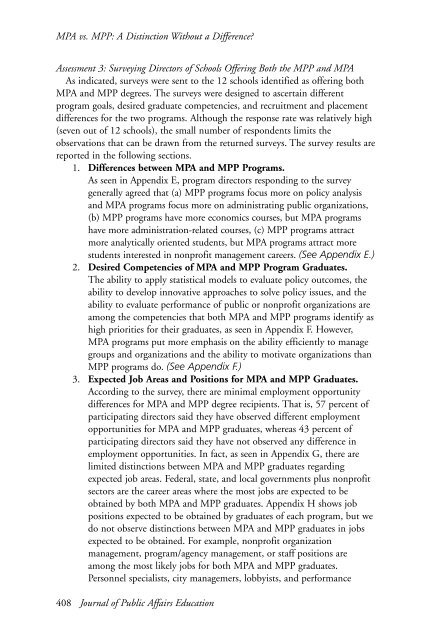JOURNAL OF PUBLIC AFFAIRS EDUCATION - National ...
JOURNAL OF PUBLIC AFFAIRS EDUCATION - National ...
JOURNAL OF PUBLIC AFFAIRS EDUCATION - National ...
You also want an ePaper? Increase the reach of your titles
YUMPU automatically turns print PDFs into web optimized ePapers that Google loves.
MPA vs. MPP: A Distinction Without a Difference?<br />
Assessment 3: Surveying Directors of Schools Offering Both the MPP and MPA<br />
As indicated, surveys were sent to the 12 schools identified as offering both<br />
MPA and MPP degrees. The surveys were designed to ascertain different<br />
program goals, desired graduate competencies, and recruitment and placement<br />
differences for the two programs. Although the response rate was relatively high<br />
(seven out of 12 schools), the small number of respondents limits the<br />
observations that can be drawn from the returned surveys. The survey results are<br />
reported in the following sections.<br />
1. Differences between MPA and MPP Programs.<br />
As seen in Appendix E, program directors responding to the survey<br />
generally agreed that (a) MPP programs focus more on policy analysis<br />
and MPA programs focus more on administrating public organizations,<br />
(b) MPP programs have more economics courses, but MPA programs<br />
have more administration-related courses, (c) MPP programs attract<br />
more analytically oriented students, but MPA programs attract more<br />
students interested in nonprofit management careers. (See Appendix E.)<br />
2. Desired Competencies of MPA and MPP Program Graduates.<br />
The ability to apply statistical models to evaluate policy outcomes, the<br />
ability to develop innovative approaches to solve policy issues, and the<br />
ability to evaluate performance of public or nonprofit organizations are<br />
among the competencies that both MPA and MPP programs identify as<br />
high priorities for their graduates, as seen in Appendix F. However,<br />
MPA programs put more emphasis on the ability efficiently to manage<br />
groups and organizations and the ability to motivate organizations than<br />
MPP programs do. (See Appendix F.)<br />
3. Expected Job Areas and Positions for MPA and MPP Graduates.<br />
According to the survey, there are minimal employment opportunity<br />
differences for MPA and MPP degree recipients. That is, 57 percent of<br />
participating directors said they have observed different employment<br />
opportunities for MPA and MPP graduates, whereas 43 percent of<br />
participating directors said they have not observed any difference in<br />
employment opportunities. In fact, as seen in Appendix G, there are<br />
limited distinctions between MPA and MPP graduates regarding<br />
expected job areas. Federal, state, and local governments plus nonprofit<br />
sectors are the career areas where the most jobs are expected to be<br />
obtained by both MPA and MPP graduates. Appendix H shows job<br />
positions expected to be obtained by graduates of each program, but we<br />
do not observe distinctions between MPA and MPP graduates in jobs<br />
expected to be obtained. For example, nonprofit organization<br />
management, program/agency management, or staff positions are<br />
among the most likely jobs for both MPA and MPP graduates.<br />
Personnel specialists, city managemers, lobbyists, and performance<br />
408 Journal of Public Affairs Education

















